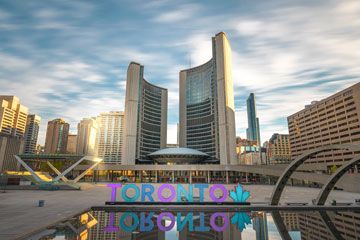
This week’s hearing about the changes to Toronto’s city council election focused on the court’s role in protecting political speech and also raised arguments about unwritten constitutional principles.

This week’s hearing about the changes to Toronto’s city council election focused on the court’s role in protecting political speech and also raised arguments about unwritten constitutional principles.
While democracy is “fundamental to Canadian society,” according to the City of Toronto’s factum, the “full scope of this principle has not yet been judicially determined.”
The hearings focused on the constitutionality of Bill 5, Better Local Government Act, 2018, which said the city should be divided into wards with boundaries identical to those of the electoral districts for Ontario.
The application judge in the case, Justice Edward Belobaba, found last year that Bill 5 infringed the s. 2(b) freedom of expression rights of both the candidates and the voters, but the Court of Appeal for Ontario stayed Belobaba’s order in September 2018.
“[T]he court challenge has exacerbated the difficult timeline the City Clerk faces in making the necessary preparations for the election,” the appeal court decision said. “The City Clerk took steps to implement a 25-ward election upon the passage of Bill 5 and then reverted to plans for a 47-ward election after the application judge's order.”
Now, the issue of the size of Toronto’s city council is back before court, amid the province’s prior statements that it could use the notwithstanding clause of the Canadian Charter of Rights and Freedoms to enforce its decision to shrink the Toronto government.
Although both Belobaba and the appeal court judges found the City of Toronto’s freedom of expression argument most compelling, Monday’s hearings focused heavily on the idea of unwritten constitutional principles. The city’s reply factum begins, “This case asks this question: What is a democratic election?” with the word “democratic” emphasized.
The city argued that Belobaba was correct in his assessment of freedom of expression, but it also argued that Bill 5 was impermissible under the Constitution Act.
“Here we have a statutory election that was in the middle [of the campaign] when Bill 5 slammed down and changed everything for everyone,” said Glenn Chu, a lawyer for the City of Toronto, at the hearing.
The panel of judges at the hearing pressed lawyers from the city for further arguments on s. 2, after lawyers for the attorney general questioned whether it was possible to restrain speech retroactively, as opposed to speech that was freely given at the time but later proved ineffective. At one point, a judge said that the city’s argument appeared to be on thin ice, closer to political science than jurisprudence.
“There is no s. 2(b) right to campaign or vote in a 47-ward election for a 47-councillor Council, as opposed to a 25-ward election for a 25-councillor Council,” the reply factum of the attorney general said. “No particular ward model or council structure is constitutionally guaranteed or immunized by s 2(b) from legislative change. Even if Bill 5 rendered some prior expression less effective or ‘wasted’ (due to ward changes or an extended nomination deadline), s 2(b) does not guarantee protection of a right to expression that is effective in achieving its objective.”
In the hearing, the judges and lawyers compared this to the difference between a gag order and giving someone a megaphone. But Chu pushed back at that notion.
“We were given a megaphone and then they smashed it,” he said.
Diana Dimmer, another lawyer for the city, pointed to the Supreme Court of Canada’s comments in Reference re Prov. Electoral Boundaries (Sask.) on the conditions of effective representation and noted that no other municipality in Ontario has been subjected to the boundary restrictions imposed on Ontario. She said that the 47-ward model was the result of consultations that accounted for factors such as growth projections and the statutory duties of councillors.
“I think it’s important to keep in mind what the City of Toronto is. It is not like the Port Authority, it is not like Metrolinx,” said Dimmer at the hearing. ”It is the sixth largest government in Canada overall, taking into account the federal government and the provincial governments.”
Saron Gebresellassi, a lawyer who was involved with a group involved in the case called Women Win TO, says the city’s argument appeals to the obvious principles of fairness that everyone learns in kindergarten — don’t change the rules in the middle of the game.
“There are these big questions in terms of what the human cost is on the ground and what it means for women in Ontario and in our city. We lost a lot of women who ran great campaigns,” says Gebresellassi, who ran for mayor last year and is now running for a role as a federal member of parliament. “I hope the city talks about the diversity question. Right now, the city is doing a good job, but it’s very technical, and the province is keeping it hyper-technical and hyper-procedural. That’s important, but those big pictures of democracy in this province — that’s what’s at stake. We have this unwritten constitutional principle of democracy. Will the panel come alive to that and call a spade a spade?”